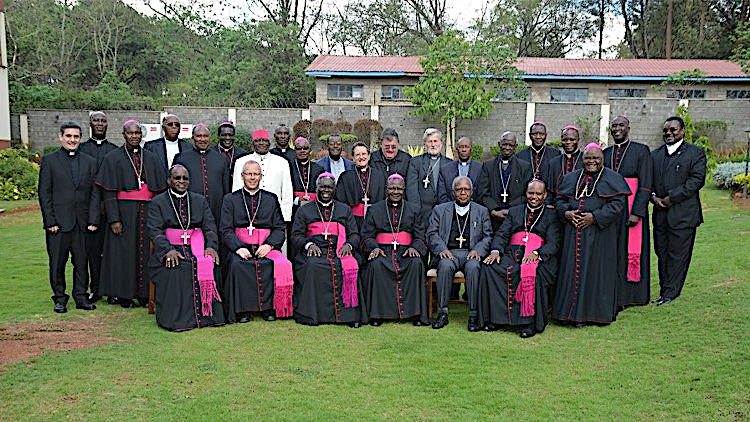KENYA: Bishops’ Conference Appeal to Kenya Government Not to Close Refugee Camps

Members of Kenya Conference of Catholic Bishops (KCCB)
Sr. Jecinter Antoinette Okoth, FSSA
Following a recent order by the government of Kenya to close two refugee camps located within Garissa and Lodwar dioceses, Church leaders under their national body, Kenya Conference of Catholic Bishops (KCCB) have urged the government not to shut down the camps especially at a time when refugees and asylum-seekers need security and more human support due to Covid-19 pandemic that is ravaging the world.
“It is highly unfortunate and regrettable that the intention by the Kenyan authorities to close Dadaab and Kakuma Refugee camps within a short timeframe comes at a time that these people need help,” reads an excerpt of the statement signed by the KCCB Chairman Archbishop Philip Arnold Anyolo adding that, “This is a time to give protection and embrace the most vulnerable in our society.”
“These brothers and sisters of ours living in the camps have become even more vulnerable due to Covid-19 pandemic which demands certain health measures to be observed in order to stay safe,” the Bishops said in their Friday statement and thanked God for His merciful love towards refugees.
The two camps government of Kenya plans to shut down host more than 410,000 people including women, children and the elderly whose lives have been disrupted by various reasons including “mismanagement of resources, bad or lack of good governance structures, immature politics, effects of climate change and generally those who have gone through various types of human rights abuses.”
According to the Prelates, hosting refugees and asylum-seekers as a country, “has been a good gesture to these people who feel safer in Kenya.”
“It is not only necessary but also important and human to support the most vulnerable in our society, giving them another chance of having a place they may call home,” the Bishops said in their collective statement dated Friday, April 9 adding, “As a God-fearing nation, we should count it a privilege to show love by hosting the refugees and asylum-seekers across the globe.”
Speaking about closure of the camps in the country that has hosted refugees and asylum-seekers for over 20 years, the Cabinet Secretary for the Ministry of Interior and Coordination of National Government in Kenya Dr. Fred Okengo Matiang’i, gave the United Nations High Commissioner for Refugees (UNHCR) “14 day ultimatum to have a road map on definite closure of Dadaab and Kakuma refugee camps,” adding “there is no room for further negotiations.”
In this regard, Church leaders have highlighted in their collective statement that “Forcefully returning refugees to Somalia, where there is still insecurity and attacks on civilians, will lead to more suffering of many vulnerable women and children.”
Besides, they said, “The principle of non-refoulement,” which under international human rights law guarantees that “no one should be returned to a country where they would face torture, cruel, inhuman or degrading treatment or punishment and other irreparable harm” should be respected.
This therefore requires that refugees under International Law, can be repatriated on voluntary return when conditions change and a free, democratic government that respects human rights, good governance and the rule of law is in place.
The Church leaders have further called on the Government to continue working with other stakeholders and to “embrace dialogue towards securing a lasting solution for the common good of refugees.”
“We recommend to the Government to shelve this unfortunate idea and instead increase security and any other support to the refugees as well as to the bodies that work directly with them in ensuring they receive their basic needs,” the Bishops appealed urging the government to “reconsider their position.”
The Prelates remind those in authority that the complex refugee situation in Kenya requires a comprehensive approach to finding solutions.


